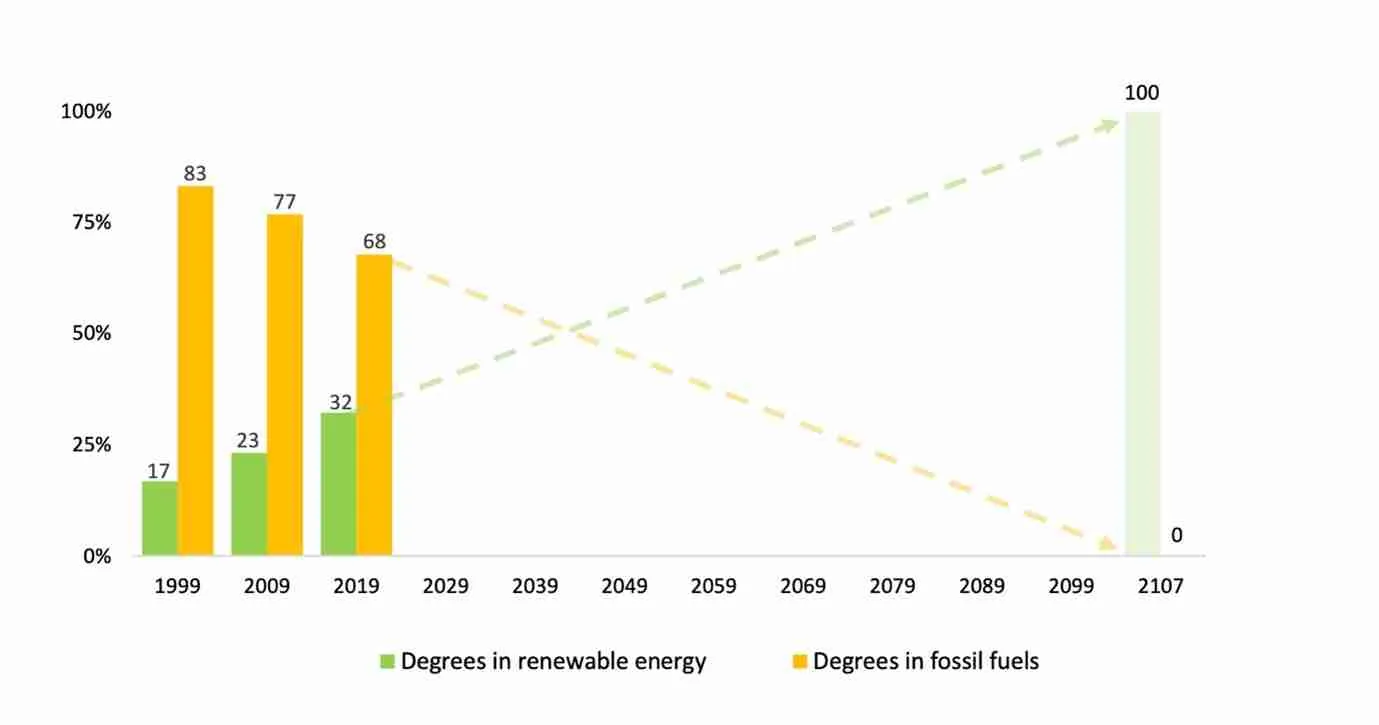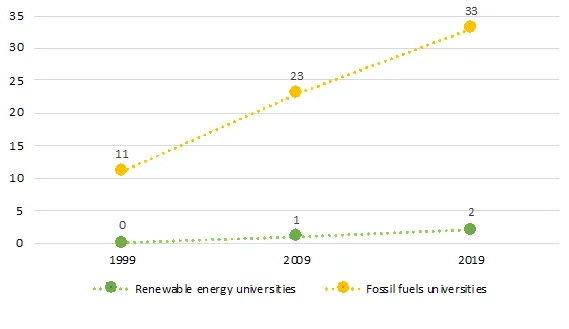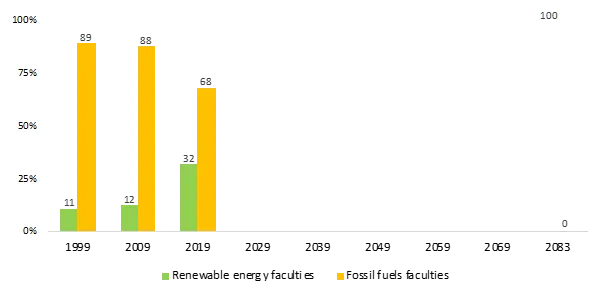Key message: The world still produces more workforce for fossil fuels than for renewable energy industries
A new study on energy transition in global higher education has been published by Energy Research & Social Science journal. In the article, the authors – Roman Vakulchuk and Indra Overland from the Norwegian Institute of International Affairs[1] – assess how quickly global higher education is transitioning from fossil fuels to renewable energy in terms of educational content. The study is based on a review of 18,400 universities in 196 countries.
The study presents several alarming findings. The main result is that the world still produces more workforce for fossil fuels than for renewable energy industries. We found that 68% of the world’s energy educational degrees are focused on fossil fuels, and only 32% on renewable energy. At the current rate of change, renewable energy university degrees would reach 100% only by the year 2107 (see Figure A). The findings show that “the rapid adoption of renewable energy worldwide is not matched by changes in higher education, since universities continue to prioritise coal and petroleum studies.” Even though the number of educational programmes on renewable energy has grown over time, they are still outnumbered by fossil fuel-oriented programmes.

Growing shortages of workforce for clean energy industries
The global energy transition involves the transformation of professions and labour markets, which in turn depend on the availability of a workforce with the right education and skill sets. According to a study by Jacobson et al. (2017), renewable electricity supply should generate 52 million full-time jobs across 139 countries by 2050. However, today one can observe growing global shortages of workforce for clean energy. According to the IEA Executive Director Fatih Birol, “the unprecedented acceleration that we have seen in clean energy transitions is creating millions of new job opportunities all over the world – but these are not being filled quickly enough.” The supply of human capital is lagging greatly behind demand in the renewable energy sector and the gap is likely to widen further as workforce shortages are also predicted in the future.
In our view, reorienting energy education towards renewables away from fossil fuels will be decisive for limiting global warming to 1.5°C by 2050, as a large and well-qualified workforce will be largely needed to reach the Paris Agreement goals. “The global energy transition requires a new generation of scientists, engineers, technicians and other specialists with the skills needed to build and manage renewable energy systems.”
However, renewable energy education remains greatly underfinanced at the global level compared to education in fossil fuels and many universities are failing to meet the growing demand for a clean energy workforce. For example, we found that there are 33 universities which fully specialisie in petroleum studies. By contrast, only two universities in the world fully focus on renewable energy. The gap between fossil fuel and renewable energy universities is large and keeps on widening in favour of fossil fuels (see Figure B).

Similar trends, although slightly more positive, can be observed at the university faculty level. Figure C compares the change in the share of energy faculties dedicated to renewables and fossil fuels between 1999 and 2019. Even though the share of fossil fuel faculties decreased over time (to 68%), it remained much larger than that of renewables (32%) in 2019.

Private universities shift to clean energy education more actively than public universities
The global share of renewable energy degree programmes at public universities increased from 16% in 1999 to 34% in 2019 and from 21% in 1999 to 39% in 2019 at private universities. Thus, private universities have been slightly more active than public universities in shifting to clean energy education (see Figure D). This may be because private universities are less prone to carbon lock-in effects.

Very slow transition to clean energy education in developing countries
Renewable energy education still lags behind fossil fuel education in most of the regions. Asia Pacific, North America and Europe have come farthest in this respect, whereas universities in Africa, the Middle East, Central and South America, and Eurasia offer much fewer educational degrees in clean energy compared to fossil fuels.
The results also indicate that “developing countries lag behind developed ones in this area, even though the need for professionals trained in renewable energy is greater in developing countries.” Along with lack of capital, underdeveloped regulatory frameworks for renewable energy, and entrenched fossil-fuel business interests, the mismatch between energy education and the needs of the renewable energy industry may hold back the energy transition in many developing countries” (see Figure E).

Carbon lock-in and risk of stranded skill sets
The global higher energy education system may be slow to reform because of the entrenched interests of the fossil-fuel industries, which have political and financial influence on higher education and create carbon lock-in effects at universities. Carbon lock-in feeds into institutional inertia, a situation when institutions (here universities) resist to change. Another important reason here is the fact that clean energy education remains greatly underfinanced both in developed and developing countries.
This poses risks to graduates who obtain fossil fuels education. Since a career may last 30-40 years, this creates a risk of stranded skill sets through (mis)education. Over time, graduates from fossil fuels programmes obtain education for industries that are scheduled to be phased out within the next decades. These graduates may be left with stranded skills, which can also lead to stranded jobs and lives, unemployment and social instability. The required cost and time for retraining people with fossil fuel education may be significant.
Policy recommendations
There are already severe shortages of skilled labour for clean energy industries. They are likely to grow further as the world will be transitioning more towards renewables. However, no one talks about phasing out degrees in fossil fuels at the time when many countries in the world are struggling to transition to renewable energy because of the shortage of skilled clean energy labour.
In our view, without urgent reform, сarbon lock-in in the global energy education system may have a detrimental impact on the energy transition. Therefore, universities and policy makers alike need to prioritize the production of human capital for clean energy industries. It is important to channel public and private funding – that now goes into supporting educational programs in fossil fuels – towards renewable energy education. Ministries of education need to work together with universities and plan fast-tracking educational degree and training programmes in solar, wind and hydro energy.
The Renewable Energy Institute is delighted to play its part in global renewable energy education and in addressing the skills gap mentioned in the study. The REI offers a wide range of accredited renewable energy and energy efficiency courses, as part of our mission to promote best practice and knowledge-sharing in the sector.


























